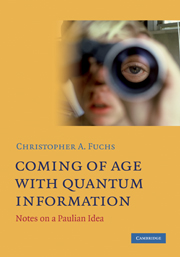Book contents
- Frontmatter
- Contents
- Foreword
- Introduction to the Cambridge University Press Edition
- Introduction to the Original ArXiv.org Posting
- Disclaimers
- Acknowledgements
- 1 Letters to David Baker
- 2 Letters to Howard Baker
- 3 Letters to Howard Barnum
- 4 Letters to Paul Benioff
- 5 Letters to Charlie Bennett
- 6 Letters to Herb Bernstein
- 7 Letters to Doug Bilodeau
- 8 Letters to Gilles Brassard
- 9 Letters to Jeffrey Bub
- 10 Letters to Carlton Caves
- 11 Letters to Greg Comer
- 12 Letters to Charles Enz
- 13 Letters to Henry Folse
- 14 Letters to Bob Griffiths
- 15 Letters to Adrian Kent
- 16 Letters to Rolf Landauer
- 17 Letters to Hideo Mabuchi
- 18 Letters to David Mermin
- 19 Letters to David Meyer
- 20 Letters to Jeff Nicholson
- 21 Letters to Michael Nielsen
- 22 Letters to Asher Peres
- 23 Diary of a Carefully Worded Paper: More Letters to Asher Peres
- 24 Letters to John Preskill
- 25 Letters to Joseph Renes
- 26 Letters to Mary Beth Ruskai
- 27 Letters to Rüdiger Schack
- 28 Letters to Robert Schumann
- 29 Letters to Abner Shimony
- 30 Letters to Jon Waskan
- 31 Letters to Bill Wootters
- 32 Letters to Anton Zeilinger
- 33 Other Letters
- Postpartum
- Index of Names
26 - Letters to Mary Beth Ruskai
Published online by Cambridge University Press: 05 October 2012
- Frontmatter
- Contents
- Foreword
- Introduction to the Cambridge University Press Edition
- Introduction to the Original ArXiv.org Posting
- Disclaimers
- Acknowledgements
- 1 Letters to David Baker
- 2 Letters to Howard Baker
- 3 Letters to Howard Barnum
- 4 Letters to Paul Benioff
- 5 Letters to Charlie Bennett
- 6 Letters to Herb Bernstein
- 7 Letters to Doug Bilodeau
- 8 Letters to Gilles Brassard
- 9 Letters to Jeffrey Bub
- 10 Letters to Carlton Caves
- 11 Letters to Greg Comer
- 12 Letters to Charles Enz
- 13 Letters to Henry Folse
- 14 Letters to Bob Griffiths
- 15 Letters to Adrian Kent
- 16 Letters to Rolf Landauer
- 17 Letters to Hideo Mabuchi
- 18 Letters to David Mermin
- 19 Letters to David Meyer
- 20 Letters to Jeff Nicholson
- 21 Letters to Michael Nielsen
- 22 Letters to Asher Peres
- 23 Diary of a Carefully Worded Paper: More Letters to Asher Peres
- 24 Letters to John Preskill
- 25 Letters to Joseph Renes
- 26 Letters to Mary Beth Ruskai
- 27 Letters to Rüdiger Schack
- 28 Letters to Robert Schumann
- 29 Letters to Abner Shimony
- 30 Letters to Jon Waskan
- 31 Letters to Bill Wootters
- 32 Letters to Anton Zeilinger
- 33 Other Letters
- Postpartum
- Index of Names
Summary
February 2000, “The Quantum View”
What a really nice article! I read it once this evening with dinner (at a place that served grilled chicken – not so easy to scroll through a computer screen under those conditions!). Now, with my jetlag in distinct control – its 3:30 AM for me – let me read it again and make a few comments here and there. (I just arrived in Haifa yesterday for a visit with Asher Peres; I'll be here a little over a week.)
Why don't you write the following for your requested reference: C. A. Fuchs, “The Structure of Quantum Information,” available at […] [Of course, it is no longer available. Instead, see note to Carl Caves, dated 21 December 1997.]
I like this view of physics as being like a jig-saw puzzle. Note a typo in this paragraph: you misspelled de Broglie.
Ruskai-ism 1:As far as I am aware, there is no evidence that either Heisenberg or Schrödinger was motivated by political or social factors.
Actually there is a pretty strong case that these two guys were indeed quite motivated by cultural factors to find an indeterministic element in physics. And that was long before quantum mechanics took a final form. Two important articles to read in this regard are:
P. Forman, “Weimar Culture, Causality, and Quantum Theory, 1918–1927: Adaptation by German Physicists and Mathematicians to a Hostile Intellectual Environment,” in Historical Studies in the Physical Sciences, Vol. 3, edited by R. McCormmach (U. Pennsylvania Press, Philadelphia, 1971), pp. 1–115.
[…]
- Type
- Chapter
- Information
- Coming of Age With Quantum InformationNotes on a Paulian Idea, pp. 413 - 417Publisher: Cambridge University PressPrint publication year: 2011



